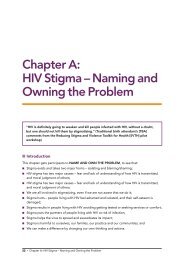Implementing Multiple Gender Strategies to Improve HIV and ... - ICRW
Implementing Multiple Gender Strategies to Improve HIV and ... - ICRW
Implementing Multiple Gender Strategies to Improve HIV and ... - ICRW
You also want an ePaper? Increase the reach of your titles
YUMPU automatically turns print PDFs into web optimized ePapers that Google loves.
WOMEN FIRST (MULHERES PRIMERO)<br />
LEAD ORGANIZATIONS:<br />
COUNTRY:<br />
<strong>HIV</strong> PROGRAM AREA:<br />
International Relief <strong>and</strong> Development (IRD)<br />
Mozambique<br />
Prevention<br />
OVERVIEW:<br />
Women First aims <strong>to</strong> increase knowledge of healthy behaviors in the community <strong>and</strong> improve<br />
women’s economic capacity. The program combines health, <strong>HIV</strong>/AIDS <strong>and</strong> entrepreneurial training<br />
with the establishment of sustainable businesses for rural women. IRD provides existing women’s<br />
groups with intense training on health <strong>and</strong> <strong>HIV</strong> <strong>and</strong> AIDS, <strong>and</strong> partners with private sec<strong>to</strong>r companies<br />
<strong>to</strong> create a supply chain of items that women entrepreneurs will sell. In response <strong>to</strong> feedback from<br />
beneficiaries, Women First also addresses women’s economic empowerment <strong>and</strong> gender-based<br />
violence. To encourage dialogue on gender-based violence, IRD collaborates with a local theater<br />
group <strong>and</strong> other community members. Combining education around <strong>HIV</strong> <strong>and</strong> violence with an<br />
income-generation component has been key <strong>to</strong> the program’s success. Another key finding is that<br />
women’s commitment <strong>to</strong> the program is more important <strong>to</strong> retention than previous entrepreneurial<br />
experience. An external evaluation shows that the program improves women’s health outcomes <strong>and</strong><br />
income, that women put their income <strong>to</strong> good use, <strong>and</strong> that participants are healthier <strong>and</strong> therefore<br />
better able <strong>to</strong> earn <strong>and</strong> <strong>to</strong> care for their families.<br />
BACKGROUND<br />
<strong>HIV</strong> & AIDS<br />
Program Goals<br />
Women First aims <strong>to</strong> increase knowledge of healthy behaviors, particularly<br />
<strong>HIV</strong> prevention, in the community, <strong>and</strong> <strong>to</strong> increase women’s economic<br />
capacity so they are better able <strong>to</strong> practice healthy behaviors. The program<br />
uses a public-private partnership <strong>to</strong> promote program sustainability <strong>and</strong><br />
increase market access in rural areas <strong>to</strong> affordable basic goods.<br />
<strong>Gender</strong> <strong>Strategies</strong><br />
Addressed<br />
<br />
<br />
Reducing violence <strong>and</strong> coercion<br />
Addressing male norms <strong>and</strong> behaviors<br />
Increasing women’s legal protection<br />
Increasing women’s access <strong>to</strong> income <strong>and</strong> productive resources<br />
Other:<br />
Description of<br />
Intervention<br />
Women First combines health <strong>and</strong> <strong>HIV</strong>/AIDS activities with entrepreneurial<br />
training sessions <strong>and</strong> the establishment of sustainable businesses for rural<br />
women. IRD provides women’s groups with intense training on health <strong>and</strong><br />
<strong>HIV</strong> <strong>and</strong> AIDS. In addition, <strong>to</strong> increase women’s access <strong>to</strong> income, IRD<br />
partners with private sec<strong>to</strong>r companies <strong>to</strong> create a supply chain for basic<br />
consumption items that women entrepreneurs sell. The program works with<br />
existing women’s groups in target districts. First, districts are selected by<br />
mapping locations where women’s groups already exist <strong>and</strong> there is limited<br />
market coverage of products produced by private sec<strong>to</strong>r partners. This<br />
helps <strong>to</strong> ensure that the program will be able <strong>to</strong> create a sustainable<br />
entrepreneurial business. Women’s groups are then selected from among<br />
those involved with World Vision’s food security program, OVATA. IRD staff<br />
present the program <strong>to</strong> the selected groups, <strong>and</strong> those that agree <strong>to</strong><br />
participate receive entrepreneurial training as s<strong>to</strong>ck-keepers <strong>and</strong> sellers.<br />
Health <strong>and</strong> <strong>HIV</strong> trainings take place in conjunction with weekly moni<strong>to</strong>ring<br />
88
















